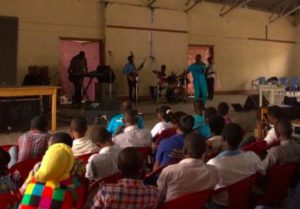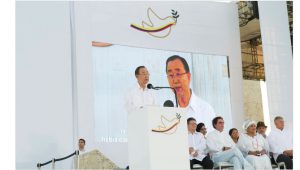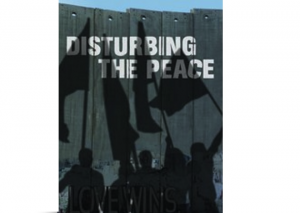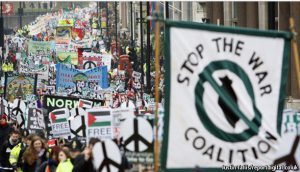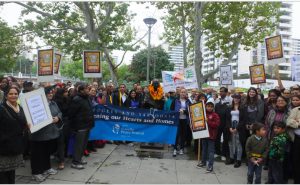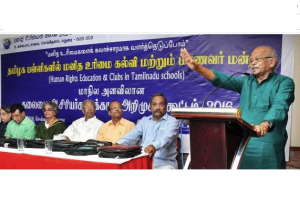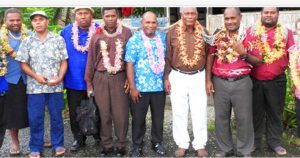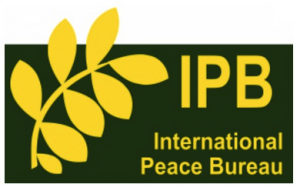.. SUSTAINABLE DEVELOPMENT ..
Press release from the International Summit of Cooperatives
From October 11 to 13, 2016, top experts and thousands of executives, decision-makers, managers and leaders from the cooperative community and other sectors will be converging on the Quebec City Convention Centre, in Canada, for the third edition of the International Summit of Cooperatives, an initiative of the Desjardins Group and the International Co-operative Alliance.
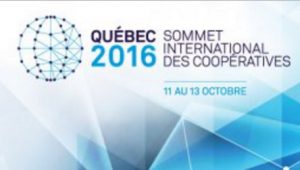
This year, the Summit is highlighting “cooperatives’ power to act,” a key instrument for sustainable development. Recognized for its contribution to the betterment of communities, the cooperative model contributes just as much to global prosperity; the 2.6 million cooperatives and mutuals with 1 billion members worldwide generate US$3 trillion annually and some 250 million direct and indirect jobs. The world’s 300 largest cooperatives alone produce combined turnover equal to Canada’s GDP. The vital forces of the cooperative community from 103 countries will therefore create fertile ground for discussions on sustainable growth.
210 speakers, including the top five distinguished economic thinkers
While growth is marked by profound changes, five leading experts will share their insights on the new global socioeconomic and geopolitical realities. Joseph Stiglitz, professor at Columbia University in the City of New York and winner of the 2001 Nobel Prize in Economic Sciences, Jeremy Rifkin, American prospective essayist, Robert Reich, professor at the University of California, Berkeley, and prominent opinion leader, Mark Kramer, founder and managing director of the FSG consulting firm in Boston, and Navi Radjou, eminent innovation and leadership advisor based in California, will discuss the major issues of the 21st century and the business models most conducive to global prosperity. More than 200 internationally renowned speakers will address the specific challenges faced by cooperatives and mutuals, and will propose concrete solutions to strengthen their role as the vector for social and economic change.
Four main themes, hundreds of topics
Summit communications will focus on four main themes, which will guide the various forums, conferences, round tables, workshops and sectoral meetings.
Acknowledging global socioeconomic and geopolitical trends and challenges will take stock of the global situation by tackling topics, such as growing inequalities, weakening real economies, the employment crisis, innovation and the emergence of the collaborative economy.
Increasing the capacity to act will discuss ways of mastering new business realities, such as the innovation culture, work in the digital era, the use of Big Data, access to capital, talent management and commitment to the community.
Expanding economic power will enable cooperative enterprises to come together and discuss business opportunities and challenges specific to their industry.
Cooperatives in action will be an opportunity to take part in the largest brainstorming session on the Sustainable Development Goals established by the UN. Various workshops will give participants a chance to propose ideas to address the challenges associated with food security, employment crisis, access to health care and social services, poverty and financial inclusion, climate change and sustainable development.
(Continued on right side of page)
Click here for a French version of this article or here for a Spanish version.
Question for this article:
What is the relation between the movement of coooperatives and the movement for a culture of peace?
(Article continued from left side of page)
64 inspiring scientific projects
On October 10 and 11, members of the scientific community from diverse backgrounds will be presenting their findings and thoughts on the power of action and the impacts of cooperatives and mutuals. These 64 research projects will be discussed by professionals from the cooperative community. This formula, linking research and practice, will provide for a dynamic and practical delivery of the authors’ work.
14 insightful studies
The Summit also offers an exceptional opportunity for participants to access exclusive information targeted specifically at cooperatives and mutuals. The results of the most recent studies on the situation of cooperatives around the world and on the most effective practices will be presented during sectoral meetings and conferences by leading experts.
More than 50 specialized activities
Alongside regular programming, the Rendez-vous give members of cooperatives, mutuals, cooperative associations and local organizations an opportunity to attend working, information or training sessions, typically by invitation. In addition to these meetings, there are also three pre-Summit activities that bring together select organizations for discussions of hot topics, namely improved efficiency and visibility of cooperatives, international development, and reconstruction after a natural disaster. Some of the 30 or so events will be open to all Summit participants.
A program for young leaders aged 20 to 35
To keep the power of cooperatives going strong, the Summit also focusses on succession. As part of the Young Leaders Program, young cooperators from around the world aged 20 to 35 will have an opportunity to meet with top executives from the cooperative community and representatives of international organizations, such as the UN and WHO, in order to learn about best practices that guide cooperatives and mutuals. These meetings, combined with the many conferences and discussions, will familiarize them with the essential role that cooperatives and mutuals play in implementing sustainable economic development strategies.
For further information on Summit activities and to register, visit: www.intlsummit.coop.
About the International Summit of Cooperatives
The International Summit of Cooperatives is the world’s leading event for business development in the cooperative and mutual community. It offers managers, decision-makers and leaders of cooperative and mutual enterprises of all size and in all sectors, as well as anyone in the world of business, a unique venue for reflection, discussion, cooperation and training on major trends, as well as on current and future economic and financial issues. By demonstrating that the cooperative business model is one answer to the major socioeconomic issues of our times, the Summit aims to promote and foster the development of cooperative enterprises in all countries. The event attracts more than 2,500 participants from 103 countries.
Marie-Josée Gauvin, International Summit of Cooperatives
+ 1 514-845-8222, ext. 222 – media@intlsummit.coop
Jan Schiettecatte, International Co-operative Alliance
+ 32 2 743 10 30 Mobile: + 32 478 84 51 30 – schiettecatte@ica.coop
(Thank you to the Good News Agency for sending us this article.)
